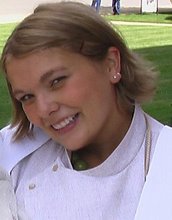This piece is part of an on-going blog series called Plurality 2.0 (watch video here). Full schedule of guest authors throughout April and May is available here.
Melissa DeRosia is pastor of the First Presbyterian Church in Caro, Michigan. Serving in her local community and in the Presbyterian Church (USA) with various governing bodies, she believes her commitment to justice and God’s kingdom invites the ambiguity of learning to love God and one another in the midst of the chaos. Follow Melissa at her blog, Sacred Screaming.
 When I first arrived in this small Midwest town to serve as the first female pastor of a traditional mainline congregation, I sought the support of other colleagues in ministry. The local ministerial association appeared to be the logical avenue to pursue. After a few unreturned phone calls I started wondering if they simply forgot to send out the welcome bandwagon or if this was a secret society of clergy that met by invitation only. Unfortunately there was truth in the latter, and though they did not turn me away from the meeting when I discovered its secret location, it was obvious they were less than thrilled that I had infiltrated the “boys club.â€
When I first arrived in this small Midwest town to serve as the first female pastor of a traditional mainline congregation, I sought the support of other colleagues in ministry. The local ministerial association appeared to be the logical avenue to pursue. After a few unreturned phone calls I started wondering if they simply forgot to send out the welcome bandwagon or if this was a secret society of clergy that met by invitation only. Unfortunately there was truth in the latter, and though they did not turn me away from the meeting when I discovered its secret location, it was obvious they were less than thrilled that I had infiltrated the “boys club.â€
Comprised of mainly self-described evangelicals, they silently protested having a female “mainliner” who stepped far outside their fundamentalist beliefs in their midst. I continued to attend those monthly meetings at first out of a desire to annoy: being present accomplished that task very quickly. Then a shift began to take place, relationships started to form. We began exploring where the commonalities of our faith, ministries, and lives overlapped. They tentatively asked questions for ideas about how to better follow Christ as disciples seeking to serve others outside of their flocks. I explored my relationship with Jesus through the perspectives of what it might mean to have a “personal” relationship with him.
In a community that has a church on every corner, and people often ask “Why can’t we all just get along?” yet wouldn’t fathom leaving the church of their parents and grandparents, I am sensing a shift taking place. There is a movement away from the secret clubs of polarized denominations and we are walking through the open door where questions are asked and honest conversations can take place. This vision of pluralism doesn’t start with the nondenominational church of the “Get Along Gang” but opens space where individuals, communities of faith, and pastors can enter into dialogue and respond with our actions in ways that bring about God’s kingdom.
I may not get the support I always need in ministry with the “boys club†of ministers in the area, I do find that our intentional conversations about who we are and who God is calling us to be shapes my ministry in meaningful and challenging ways.